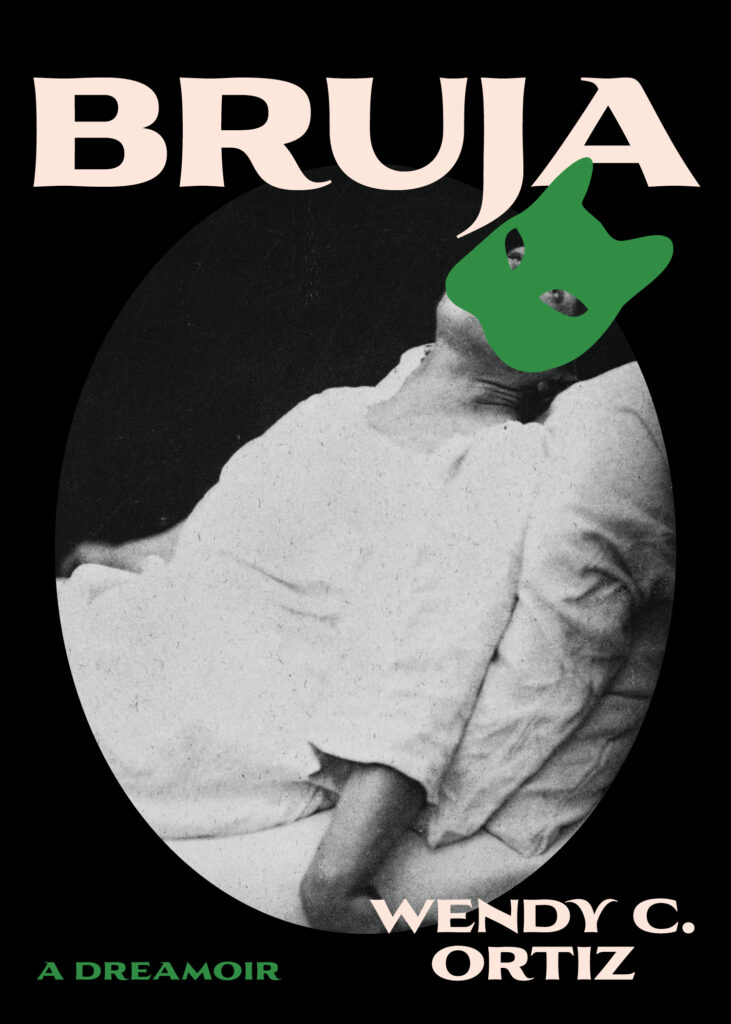
The dreamscape of a haunted and hopeful woman, back in print
Dubbed a “dreamoir,” Bruja is a bold and harrowing journey through the dream worlds of Wendy C. Ortiz. Sister memoir to Hollywood Notebook, it catalogs the happenings of the night: strange visions of the past warped by present-day inklings; animals running loose, never where they should be; familiar nature and architecture made malleable and new. Ortiz’s subconscious is bared in full on these pages as the author interrogates her histories. We bravely adventure into new literary form, walking the parallel plane of Ortiz’s waking life alongside her. Where the self is anchored in the deepest recesses of the mind, Ortiz invites us to push the boundaries of the subconscious and enter into the dreamoir.
“Bruja is not just a book; it is an enigma and a wonder and utterly entrancing.” —Roxane Gay, NYT bestselling author of Bad Feminist
“[Bruja] is a testament to Ortiz’s courage as a memoirist that she’s willing to live for a while on this submarine plane, among the elements that dictate her fate—and to invite her readers along for the show.” —Los Angeles Times
“Wendy C. Ortiz has invented her own genre, in her sleep, no less. Bruja is at once lush and spare, funny and weird, disturbing and sometimes even beautiful in the way that dreams can be. She’s crafted an absurdly real and compelling story here, one dream at a time.” —Elizabeth Crane, author of The History of Great Things
“Ortiz is making bold statements about love, desire and womanhood as she defiantly navigates the absurdities and strangeness of everyday reality and taps into the comforting properties of fantasy and daydream.” —NBCNews.com
“Ortiz’s dreamoir is a multidimensional love story with the whole mess of existence. I loved it.”—Dodie Bellamy, author of The TV Sutras
“This is a smart, strange, wonderfully expressive combination of fact and everything that hovers in the periphery of fact.” —Vol. 1 Brooklyn
“Like all of us, Ortiz’s dream persona questions and doubts decisions and is full of wonderment at what desire and the self will be in the future. [Bruja] reads as though it is on loop: there is no beginning and no ending, only a series of isolated moments of existence that simultaneously trap us and shape us into who we will be in our waking lives.” —Melissa Grunow, Coal Hill Review
Los Angeles Times review of Bruja by Ellie Robins (December 2016)
NBC News: “Amid Uncertain Times, 11 New & Necessary Latino Books to Read” by Rigoberto González
Vol. 1 Brooklyn review of Bruja by Gabino Iglesias
Bruja honored as one “Best Work of Experimental Literature (Film Editing)” in LitHub‘s “If They Gave Oscars to Books, Our 2016 Nominees” (Feb. 2017)
Bruja on Literary Hub‘s Best Books of 2016 list
“In the Clutches of the Dreamoir” review by Matt E. Lewis for The Nervous Breakdown
“It the Interior’s Interior”: Vol. 1 Brooklyn interview with Tobias Carroll
Review of Bruja by Olga García Echeverría in La Bloga
“On Día de los Muertos and the Omens of Dreams” by Tina Vasquez at Rewire
“Wendy C. Ortiz Chronicles a Dreamscape” interview with Nicholas Rys for Electric Literature
“The 15 Must-Reads From Latin American and Latino Authors in 2016” from Remezcla
“She wields the dusky noir of Phillip Marlowe’s LA as deftly as the grime of Bukowski’s, intermingling them as nature intended, knowing that they don’t exist independently but conjoined, symbiotic. More than that, she channels the kind of quiet, surreal, late-afternoon quality that Didion used to describe bougainvillea-covered bungalows or strip malls baked in the sun…It is in this fashion that Ortiz explores herself and her world: she extends the Lynchian weirdness of Mullholland Drive to cover all aspects of her own life there – every musky pupuseria, immaculately-trimmed rosebush behind white iron bars, or laundromat where John Varvatos and dollar-store fashions are washed side by side.”—Matt E. Lewis, The Nervous Breakdown
“What Ortiz does for the memoir here is comparable to what Flaubert’s Madame Bovary did for modern realist narration or what Capote’s In Cold Blood did for the nonfiction novel. Simply put, Ortiz’s “dreamoir” is a new thing and this book will be the starting point for a movement as well as the go-text for all upcoming memoirs that inhabit the interstitial space between reality, memory, very personal surrealism, and dreams.” —”Best 21 Books of 2016″, [PANK]